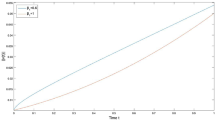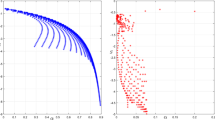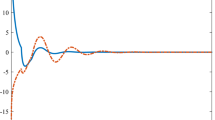Abstract
This paper puts forward a novel stability criterion of all cases of the time-delay fractional-order financial systems(FFS) including FFS without time delay, FFS with constant time delay and FFS with time-varying delay. This novel stability criterion is mainly based on a new stability judgment method which contains the deduction of Wirtinger inequality, Integral mean value theorem, fractional-order Lyapunov method, and a new functional transformation lemma which we deduced. This new functional transformation lemma simplifies the structure of the novel stability criterion with fewer constraints. Thus, compared with the previous stability criterion of FFS, the novel stability criterion of FFS has clearer structure and lower conservatism. Moreover, the novel stability criterion of FFS can also satisfy all fractional-order operators from 0 to 1. Last but not least, some numerical simulation examples are provided to verify the effectiveness and the benefit of the proposed novel stability criterion of FFS.
Similar content being viewed by others

References
S. Liang, R. Wu, and L. Chen, “BIBO stability of fractional-order controlled nonlinear systems,” International Journal of Systems Science, vol. 48, no. 7, pp.1507-1514, December 2017.
H. Yu, G. Cai, and Y. Li, “Dynamic analysis and control of a new hyperchaotic finance system,” Nonlinear Dynamics, vol. 67, no. 3, pp. 2171–2182, September 2011.
L. Zhang, G. Cai, and X. Fang, “Stability and hybrid synchronization of a time-delay financial hyperchaotic system,” Journal of Information and Computing Science, vol. 10, no. 3, pp. 189–198, May 2015.
J. Ding, W. Yang, and H. Yao, “A new modified hyperchaotic finance system and its control,” Journal of Information and Computing Science, vol. 8, no. 1, pp. 59–66, April 2009.
U. E. Kocamaz, A. Göksu, Y. Uyaroğlu, and H. Takn, “Controlling hyperchaotic finance system with combining passive and feedback controllers,” Information Technology & Control, vol. 47, no. 1, pp. 45–55, May 2018.
C. Lin, “A four-dimensional hyperchaotic finance system and its control problems,” Journal of Control Science & Engineering, no. 6, pp. 1–12, February 2018.
M. J. Hai and C. Y. Shu, “Study for the bifurcation topological structure and the global complicated character of a kind of non-linear finance system,” Applied Mathematics and Mechanics, vol. 22, no. 11, pp. 1375–1382, November 2001.
L. He and X. Wang, “Parameters estimation and stability analysis of nonlinear fractional-order economic system based on empirical data,” Abstract and Applied Analysis, vol. 2014, no. 2, pp. 1–11, April 2014.
Y. G. Yang, W. Xu, Y. H. Sun, and Y. W. Xiao, “Stochastic bifurcations in the nonlinear vibroimpact system with fractional derivative under random excitation,” Communications in Nonlinear Science & Numerical Simulation, no. 42, pp. 62–72, January 2017.
C. J. Wu, S. Lv, J. C. Long, J. H. Yang, and A. F. S. Miguel, “Self-similarity and adaptive aperiodic stochastic resonance in a fractional-order system,” Nonlinear Dynamics, vol. 91, no. 3, pp. 1697–1711, February 2018.
B. B. He, H. C. Zhou, Y. Q. Chen, and C. H. Kou, “Asymptotical stability of fractional order systems with time delay via an integral inequality,” Iet Control Theory & Applications, vol. 12, no. 12, pp. 1748–1754, April 2018.
M. Ardashir and G. Sehraneh, “Robust synchronization of uncertain fractional-order chaotic systems with timevarying delay,” Nonlinear Dynamics, vol. 93, no. 4, pp. 1809–1821, September 2018.
B. Du, Y. H. Wei, S. Liang and Y. Wang, “Rational approximation of fractional order systems by vector fitting method,” International Journal of Control Automation & Systems, vol. 15, no. 1, pp. 186–195, February 2017.
S. Song, X. N. Song, N. Pathak, and T. B. Ines, “Multiswitching adaptive synchronization of two fractional-order chaotic systems with different structure and different order,” International Journal of Control Automation & Systems, vol. 15, no.43, pp. 1524–1535, August 2017.
Q. Wang and D. L. Qi, “Synchronization for fractional order chaotic systems with uncertain parameters,” International Journal of Control Automation & Systems, vol. 14, no. 1, pp. 211–216, February 2016.
M. Saliha, C. Mohammed, and B. Djillali, “A novel approach of admissibility for singular linear continuous-time fractional-order systems,” International Journal of Control Automation & Systems, vol. 15, no. 2, pp. 959–6964, April 2017.
S. Wang and R. C. Wu, “Dynamic analysis of a 5D fractional-order hyperchaotic system,” International Journal of Control Automation & Systems, vol. 15, no. 3, pp. 1003–1010, June 2017.
B. S. Vadivoo, R. Raja, J. D. Cao, H. Zhang, and X. D. Li, “Controllability analysis of nonlinear neutral-type fractional-order differential systems with state delay and impulsive effects,” International Journal of Control Automation & Systems, vol. 16, no. 2, pp. 659–669, April 2018.
Z. B. Wu, Y. Z. Zou, and N. J. Huang, “A system of fractional-order interval projection neural networks,” Journal of Computational & Applied Mathematics, vol. 294, no. 1, pp. 389–402, March 2016.
I. Matychyn and V. Onyshchenko, “On time-optimal control of fractional-order systems,” Journal of Computational & Applied Mathematics, vol. 339, pp. 245–257, September 2018.
B. Bayour and F. M. T. Delfim, “Existence of solution to a local fractional nonlinear differential equation,” Journal of Computational & Applied Mathematics, vol. 312, no. 1, pp. 127–133, March 2017.
V. Gafiychuk, D. Bohdan, and V. M. Vitalii, “Mathematical modeling of time fractional reaction-diffusion systems,” Journal of Computational & Applied Mathematics, vol. 220, no. 1, pp. 215–225, October 2008.
G. A. Javier and D. A. Manuel, “Boundedness and convergence on fractional order systems,” Journal of Computational& Applied Mathematics, vol. 296, pp. 815–826, April 2016.
Y. J. Fan, X. Huang, Z. Wang, and Y. X. Li, “Nonlinear dynamics and chaos in a simplified memristor-based fractional-order neural network with discontinuous memductance function,” Nonlinear Dynamics, vol. 93, no. 2, pp. 611–627, July 2018.
R. Z. Luo and Y. H. Zeng, “The control and synchronization of fractional-order Genesio-Tesi system,” Nonlinear Dynamics, vol. 88, no. 3, pp. 2111–2121, May 2017.
B. K. Lenka and S. Banerjee, “Sufficient conditions for asymptotic stability and stabilization of autonomous fractional order systems,” Communications in Nonlinear Science & Numerical Simulation, vol. 56, pp. 365–379, March 2018.
Y. Q. Chen, Y. H. Wei, X. Zhou, and Y. Wang, “Stability for nonlinear fractional order systems: an indirect approach,” Nonlinear Dynamics, vol. 89, no. 2, pp. 1011–1018, July 2017.
S. Rathinasamy and Y. Ren, “Approximate controllability of fractional differential equations with state-dependent delay,” Results in Mathematics, vol. 63, no. 3–4, pp. 949–963, June 2013.
K. M. ALi, T. Hamed, and B. Oscar, “On dynamic sliding mode control of nonlinear fractional-order systems using sliding observer,” Nonlinear Dynamics, vol. 92, no. 3, pp. 1379–1393, May 2018.
F. D. Marius, F. Michal, V. K. Nikolay, and G. R. Chen, “Complex dynamics, hidden attractors and continuous approximation of a fractional-order hyperchaotic PWC system,” Nonlinear Dynamics, vol. 91, no. 4, pp. 2523–25, March 2018.
O. Zaid, “A note on phase synchronization in coupled chaotic fractional order systems,” Nonlinear Analysis Real World Applications, vol. 13, no. 2, pp. 779–789, April 2012.
M. P. Aghababa, “Stabilization of a class of fractionalorder chaotic systems using a non-smooth control methodology,” Nonlinear Dynamics, vol. 89, no. 2, pp. 1357–1370, July 2017.
M. V. Fidel and M. G. Rafael, “A reduced-order fractional integral observer for synchronization and antisynchronization of fractional-order chaotic systems,” IET Control Theory & Applications, vol. 12, no. 12, pp. 1755–1762, August 2018.
Y. G. Tang, N. Li, M. M. Liu, Y. Lu, and W. W. Wang, “Identification of fractional-order systems with time delays using block pulse functions,” Mechanical Systems& Signal Processing, vol. 91, pp. 382–394, July, 2017.
M. Saliha, C. Mohammed, and B. Djillali, “New admissibility conditions for singular linear continuous-time fractional-order systems,” Journal of The Franklin Institute, vol. 354, no. 2, pp. 752–766, January 2017.
A. G. Mohammed, B. Djillali, and C. Mohammed, “Influence of discretization step on positivity of a certain class of two-dimensional continuous-discrete fractional linear systems,” IMA Journal of Mathematical Control and Information, vol. 35, no. 3, pp. 845860, September 2018.
M. W. Zheng, L. X. Li, H. P. Peng, J. H. Xiao, Y. X. Yang, Y. P. Zhang, and H. Zhao, “Finite-time stability and synchronization of memristor-based fractional-order fuzzy cellular neural networks,” Communications in Nonlinear Science & Numerical Simulation, vol. 59, pp. 272–291, June 2018.
A. Ricardo, “A Caputo fractional derivative of a function with respect to another function,” Communications in Nonlinear Science & Numerical Simulation, vol. 44, pp. 460–481, March 2017.
D. Baleanu, G. C. Wu, and S. D. Zeng, “Chaos analysis and asymptotic stability of generalized Caputo fractional differential equations,” Chaos Solitons & Fractals, vol. 102, pp. 99–105, September 2017.
D. Y. Chen, R. F. Zhang, X. Z Liu, and X. Y. Ma, “Fractional order Lyapunov stability theorem and its applications in synchronization of complex dynamical networks,” Communications in Nonlinear Science & Numerical Simulation, vol. 19, no. 12, pp. 4105–4121, December 2014.
F. Jarad, T. Abdeljawad, and D. Baleanu, “Stability of q-fractional non-autonomous systems,” Nonlinear Analysis Real World Applications, vol. 14, no. 1, pp. 780–784, February 2013.
G. F. Anaya, G. N. Antonio, J. J. Galante, R. M. Vega, and E. G. H. Martínez, “Lyapunov functions for a class of nonlinear systems using Caputo derivative,” Communications in Nonlinear Science & Numerical Simulation, vol. 43, pp. 91–99, February 2017.
Z. Zhang, J. Zhang, and Z. Y. Ai, “A novel stability criterion of the time-lag fractional-order gene regulatory network system for stability analysis,” Communications in Nonlinear Science & Numerical Simulation, vol. 66, pp. 96–108, January 2019.
Author information
Authors and Affiliations
Corresponding author
Additional information
Recommended by Associate Editor M. Chadli under the direction of Editor PooGyeon Park. This work is supported by National Nature Science Foundation of China (No.61573299), the Science and Technology Plan Project of Hunan Province(2016TP1020), the Natural Science Foundation of Hunan Province (No.2017JJ2011), the Research Project of the Education Department of Hunan Province(No.17A031), the youth project of Fujian Education Department (JAT170457), the Fujian Natural Science Foundation (2018J01806), the Open Project of Fujian Provincial Key Laboratory of Information Processing and Intelligent Control (MJUKF201737) and the Scientific Research Program of Outstanding Talents in Universities of Fujian Province.
Zhe Zhang received the M.S. degree from the School of automation, China university of geosciences (Wuhan),Wuhan, China, in 2015. He is currently pursuing a Ph.D. degree with the College of Electrical and Information Engineering, Hunan University, Hunan, China. His current research interests includecomplex networks,chaos,and nonlinear dynamics and control.
Jing Zhang received the M.S. degree from the College of Electrical and Information Engineering, Hunan University, Hunan, China, in 1984, and the Ph.D. degree from the College of Electrical and Information Engineering, Hunan University, Hunan, China, in 1997. He was vice-chancellor of hunan university from 2002 to 2013, and he was once party secretary of the party committee of Xiangtan university from 2013 to 2016.
Fanyong Cheng received the Ph.D. degree in Control Science and Engineering from the Hunan University, China. His current research interests include Machine Learning, Pattern Recognition and Image Processing. He is working at Fujian Provincial Key Laboratory of Information Processing and Intelligent Control, Minjiang University, Fuzhou, China.
Feng Liu is a Professor at the School of Automation, China University of Geosciences, Wuhan. He received his Ph.D. degree from Huazhong University of Science and Technology in 2008. From 2009 to 2011, he was a Postdoctoral Fellow with the department of electronics and information engineering, Huazhong University of Science and Technology. His research interests include nonlinear dynamical systems, complex systems, complex networks, impulsive hybrid system, and intelligent control.
Rights and permissions
About this article
Cite this article
Zhang, Z., Zhang, J., Cheng, F. et al. A Novel Stability Criterion of Time-varying delay Fractional-order Financial Systems Based a New Functional Transformation Lemma. Int. J. Control Autom. Syst. 17, 916–925 (2019). https://doi.org/10.1007/s12555-018-0552-5
Received:
Revised:
Accepted:
Published:
Issue Date:
DOI: https://doi.org/10.1007/s12555-018-0552-5



